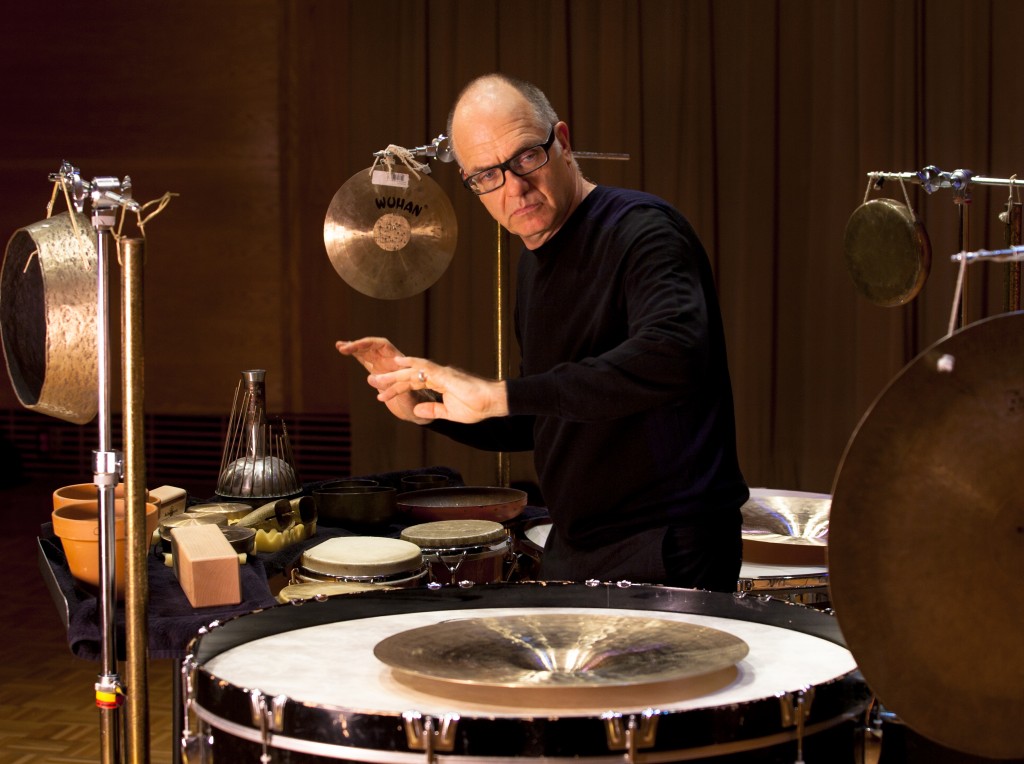Body and soul, Steven Schick displays his percussion mastery

Steven Schick performed the first of two programs Thursday night at the Miller Theatre. Photo: Bill Dean
In an interview on radio station WKCR the day before his dazzling solo concert Thursday night at Miller Theatre, percussionist Steven Schick described his himself as “a linguist working in the land of noises.” Those words reveal both the nature of Schick’s playing and the new world that is post-WWII percussion music with typical depth, clarity and simplicity.
Schick, as musician and conductor, is a frequent visitor to New York, especially at Miller, the leading venue for new music for the last sixty years. Thursday’s concert was the first of two in the series “Steven Schick: Solo” that showcase the man and survey the music in which he is an unparalleled interpreter. Opening night was called “Origins,” with what can be called standard works, while Saturday night’s “Responses” concert is made up of music that Schick comissioned and/or premiered.
The composers on the “Origins” program included giants of twentieth century music (Stockhausen, Morton Feldman, Xenakis); the contemporary master of eloquent complexity, Helmut Lachenmann with his wonderful Intérieur I; and conceptual and theatrical pieces by Vinko Globukar (Toucher and ?Corporeal) and Alvin Lucier (Silver Streetcar for the Orchestra).
Stockhausen and Xenakis are at the core of Schick’s body of work. He explained from the stage that he has been performing the former’s Zyklus for forty years and played it to begin the concert; he has also made the definitive recordings of the latter’s Psappha and Rebonds, the pieces that bookended the second half.
These three works, together, hint at the importance and scope of contemporary percussion music. After five hundred years of gradually accreting knowledge about how music could be made, the emancipation of the percussion section from the orchestra (inaugurated by Edgard Varése), along with the development of electronic music, unfolded a dimension of new instruments and entirely new compositional and notational language. Toucher, a flowing and expressive work, was the only composition written in standard notation.
The explosive and dizzying possibilities still sound fresh in Zyklus, where Stockhausen’s personality bursts through in his need to find his own means outside the calcifying ideology of serialism. The music can be played from any point, in circular fashion, until the musician has run through the score. Schick began with Stockhausen’s tight, serial-based structures and then moved quickly into dynamic, intuitive music that refused to be controlled by process. Schick’s judgement meant the piece spun back to a repeated phrase before finishing, a gesture of personal freedom that resonated with the musician and audience.
Xenakis’ own unique structural and compositional thinking connected mathematical processes to expressive ideas rooted in the dawn of Western civilization. Psappha and Rebonds are modern rituals, abstract in style but fundamentally narrative and dramatic. There is ancient poetry in each, Sappho in the former and ceremonial chanting in the latter.
Schick has absolute command of this music. His counting in Psappha is especially impressive. He is a lyrical percussionist, whether kicking the bass drum pedal or flicking his fingertip off a tubular bell, as he did with exquisite care and beauty in the hushed interior of Feldman’s The King Of Denmark (the musician plays that piece with bare hands). Striking his instruments in time with sticks and his hands, he connects events together in phrases that would sound like Mozart on the piano. He has a graceful, elegant physical style, twisting and turning his body into the shape of clefs as he plays. Every motion has a musical and expressive purpose.
He was almost hyperactive in the Feldman piece, but never busy or rushed. He was focused and succinct in Lucier’s study for triangle. This is a trademark work for the composer, an exploration of the fundamental features of pitched sound that also elevates the simplest instrument. Schick beat the miked triangle regularly and rapidly, muting it slightly with his left hand before letting the sound ring. In Miller Theatre’s space, the repeating, complex waves created a steady, singing sympathetic pitch that hummed along with his playing, both a physics lesson and a magic trick.
Schick is also an expert theatrical musician. Globukar’s pieces are theatrical, requiring musicians who can handle the technical challenges are confident and perform in an unselfconscious manner. The first of his two works, Toucher, has the percussionist reciting a French translation of Berthold Brecht’s play The Life of Galileo while shaping the vocal lines with objects chosen for their emulation of French vowel sounds. As the speaking voice drops, the instruments convey form and meaning. As fussy this seems, the music is direct and natural, and Schick delivered it with ease and charm.
More dramatic, and difficult to play, is ?Corporeal, a stunning, deeply avant-garde piece of percussion theater, both atavistically primitive and conceptually advanced. Schick sat at the front of the stage, bare-chested and barefoot, as the score instructs, bathed in red light. The body is the instrument: there are expected sounds like toungue clicks and hands slapping the chest, and surprising ones like breathing. Schick lay on the floor and snored, he sat in a lotus position and then lifted and balanced his body on his hands while reciting text. He matched the mesmerizing physicality of the piece with a natural sense of comfort in, literally, his own skin.
Schick’s encore was as unusual and direct as the music he played. He recited, from memory, Wendell Berry’s beautiful, earthy poem Manifesto: The Mad Farmer’s Liberation Front, a credo of a piece with his art.
“Steven Schick: Responses” takes place 8 p.m. Saturday at Miller Theatre. millertheatre.com